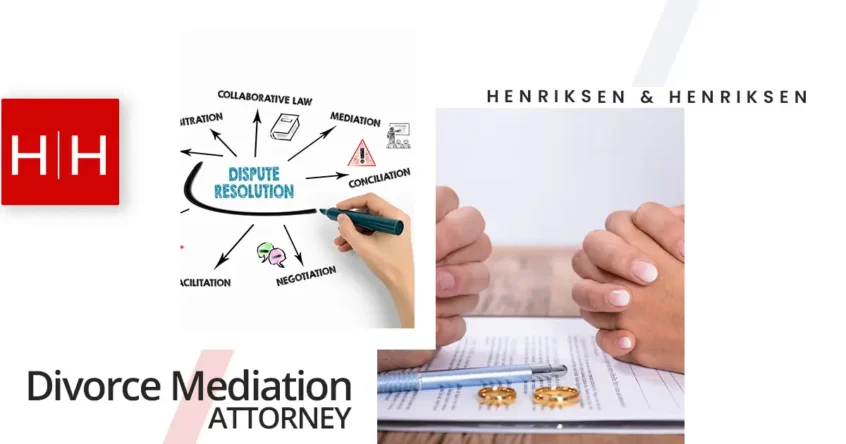Divorce Mediation Checklist: Tips from Experienced Utah Divorce Mediators

So, your divorce case has been referred to a mediation attorney in Utah. Or maybe you and your spouse are hoping to avoid a lengthy court battle by mediating first and then filing for a mutual consent divorce.
Like many others, you’re probably asking yourself: does mediation even work?
The short answer is yes, mediation works most of the time. It can be a helpful way to reduce animosity, save money, resolve conflict, and finalize your divorce quickly. But the trick is to do it correctly.
If you want to make the most of your time and energy, here’s some advice from experienced mediation lawyers in Utah.
A Comprehensive Divorce Mediation Checklist
First things first: mediation is not meant for everyone. It only works when there’s no power imbalance, both parties agree to be transparent, each spouse desires a quick settlement, and everyone is still courteous to each other.
That said, if you do decide on divorce mediation sessions, we have shared a few tips to keep your case on track and out of court.
1. Prepare to Compromise
It’s not uncommon for divorcing couples to have some bad blood. You might want to get even or repaid for any sadness you might have experienced during the marriage.
However, when you enter mediation, you must give to get. You aren’t going to receive everything you want. Think about what you would be willing to give up in exchange for something more important. For example, would you agree to a little less child support if you got more custodial time?
A good way to approach this is to clearly define your priorities and goals. Consider what matters the most to you, whether it’s the well-being of your children, retaining certain assets, or fair property division. Once you know your priorities, you’ll have a better hand at the ensuing negotiations.
2. Know What You Have
Utah divorce law requires an equitable division of marital property. Remember, equitable means fair, but not necessarily equal. To know whether a property division is reasonable, you must know what it’s worth and understand associated liabilities, if any.
Create an itemized list of your assets and debts. Be sure to include:
- Credit card balances and monthly interest rates
- Boats, RVs, off-road vehicles, and watercrafts
- Homes with approximate values
- Mortgage balances and monthly payment obligations
- Retirement accounts
- Bank savings, checking, and investment accounts
- Furniture
- Collectibles
- Medical debt
- Cash value life insurance accounts
In this regard, learn to keep your emotions in check. If your spouse ends up getting an asset you wanted, try to look past it.
Let’s say your ex gets to keep the marital home. Think about how that could benefit you. Maybe you don’t have to pay a mortgage anymore. Or maybe, your kids won’t have to change schools because your ex is living in the same place.
3. Create a Realistic Financial Plan
If your divorce is going to include alimony or child support, you’ll need to know how much is enough to support you and your children moving forward.
Create a conservative spending plan with household expenses, medical copays, vehicle costs, food, and clothing. Not only will this help you assess what you need, but also let your former spouse know where the money will go.
4. Prepare Well
We cannot stress this enough- do your homework before you enter mediation. Have financial statements (present-day, date of separation, and date of marriage) ready for review. You’d also want to have three years of tax returns, three months of pay stubs, and evidence of profit or loss if you’re self-employed.
Ask your mediation attorney in Utah whether they think your property should be appraised. And in case you’re in doubt, talk to a divorce financial planner to determine what you might need to meet your financial goals.
5. Focus on the Kids
If you have minor children, keep their needs front and center. Custody, child, support, and everything in between depend on who gets the kids.
Draft a detailed parenting plan that addresses custody arrangements, visitation schedules, and decision-making responsibilities. Your motive should be to make the transition as easy as possible for your children and help them maintain a loving relationship with both parents.
6. Be Specific
Many post-judgment motions bring couples back to court because their original judgments weren’t clear. One way to avoid this frustration is to be highly specific in the terms of your divorce agreement. Even if you and your spouse plan on being flexible, setting deadlines for tasks like mortgage refinancing or having concrete visitation schedules will give you something to fall back on in case there’s a disagreement.
You and your spouse can always agree to do something not outlined in your divorce agreement, but it should serve as a guideline for worst-case scenarios when there’s no room for communication.
7. Be Careful About Choosing a Divorce Mediation Attorney
Mediation is a skill. And not all mediation lawyers in Utah are good at it. Ideally, you want an attorney with years of experience negotiating successful divorce mediation sessions.
Your lawyer will review agreements, give answers tailored to your case, and help you navigate the legal waters successfully. They’ll also facilitate better communication between you and your spouse, ensuring everyone stays on the same page.
Make sure your chosen Utah divorce mediator is certified and has the right qualifications. Client testimonials, reviews, and referrals can offer valuable insights into their ability to navigate challenging situations and broker positive outcomes.
8. Consider Creative Solutions
Since you’re so close to the situation, you might not see all the potential creative solutions to your problems. That’s another reason why Utah mediation services are so useful. A mediator can help you think outside the box and find solutions you might not have thought of alone.
The Bottom Line
There you have it: a divorce mediation checklist to guide your mediation journey. The tips mentioned above should assist you in making the most out of a tough situation. Just remember: do what it takes to walk into the mediation room prepared. Keep your goals in mind and emotions in check- you should have nothing to worry about.
At Henriksen & Henriksen, our Utah divorce mediators understand the intricacies of family law and the emotional toll that divorce can take. We prioritize effective communication, expert negotiation skills, and a commitment to securing fair and legally sound agreements for our clients. Get in touch with us for a free consultation today!
